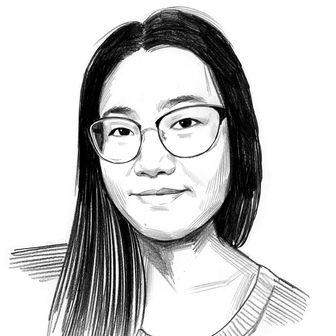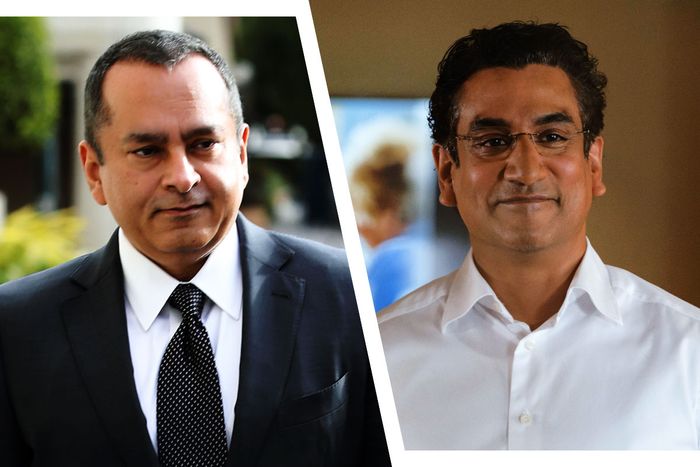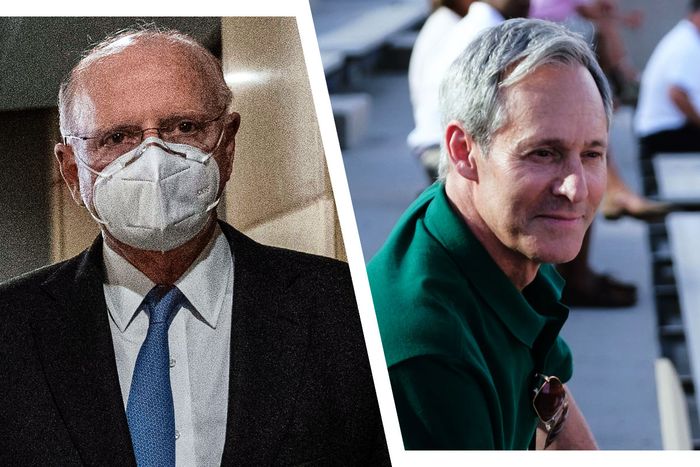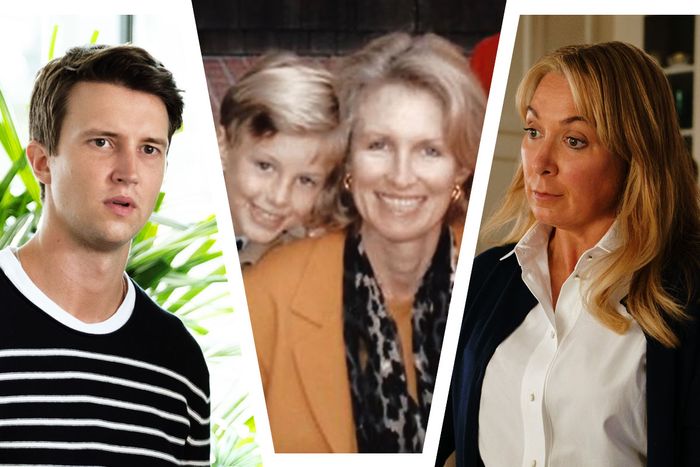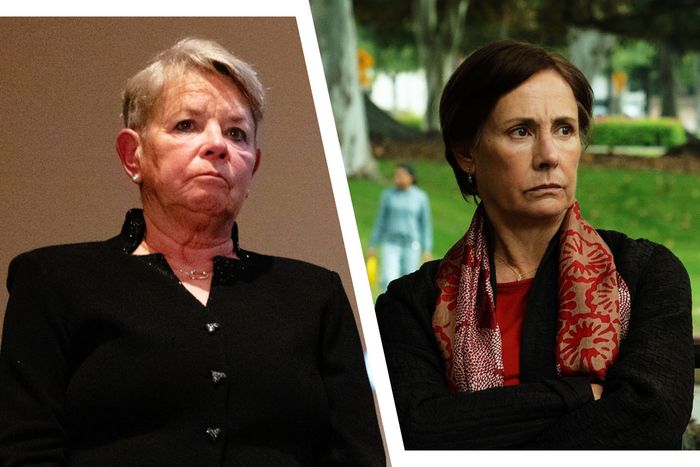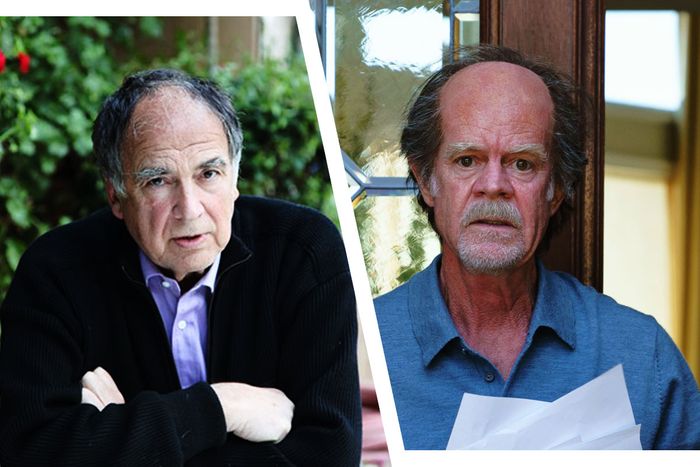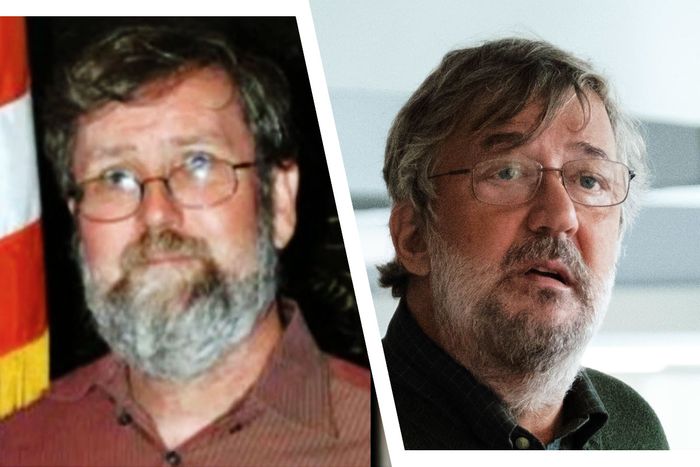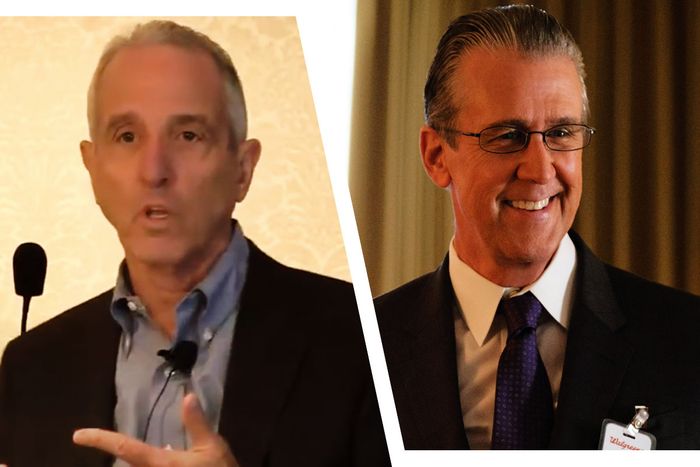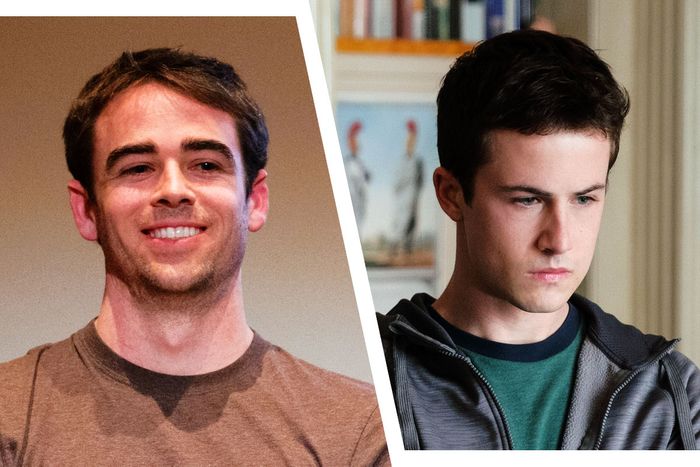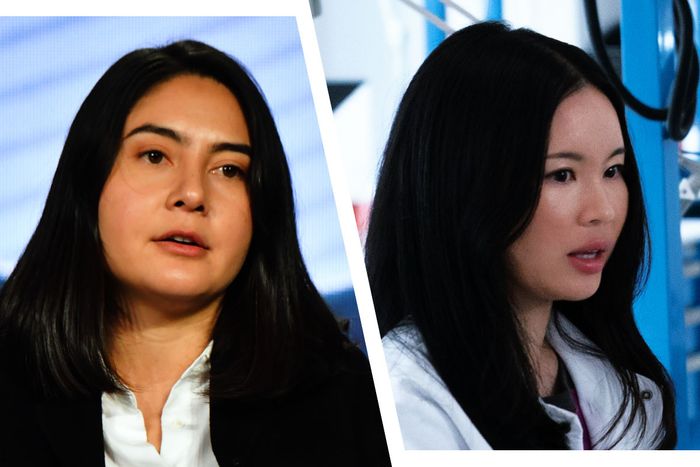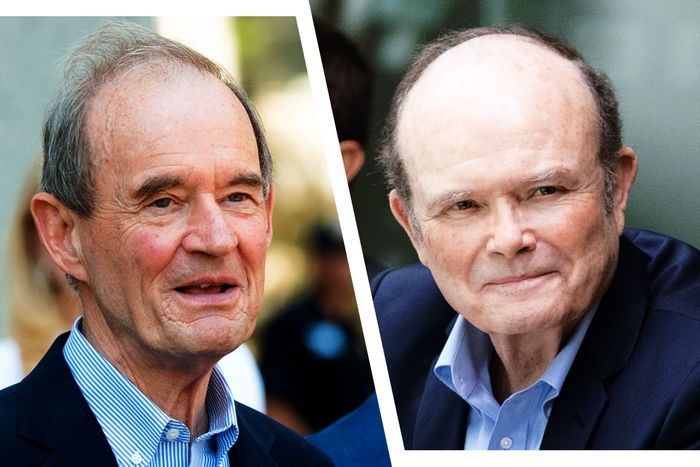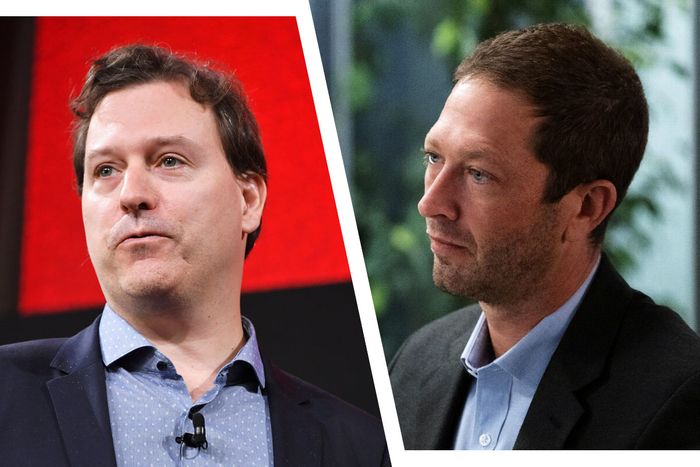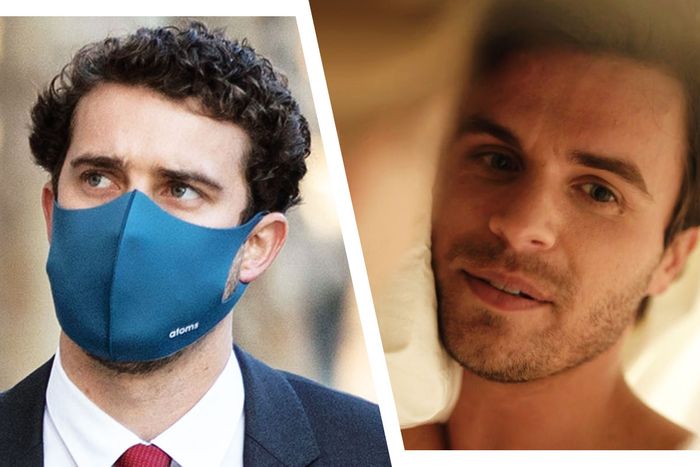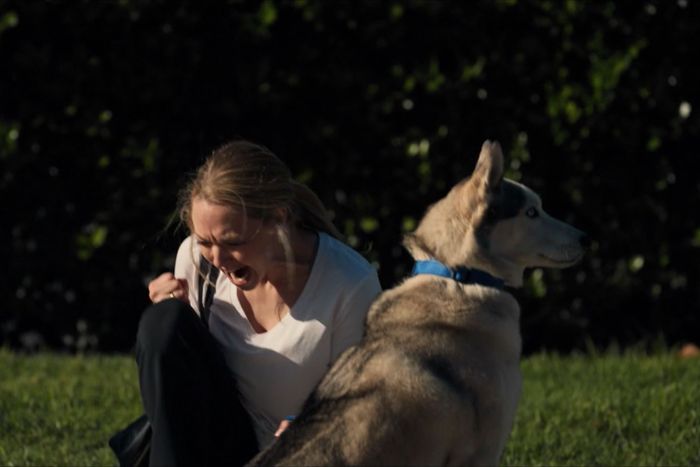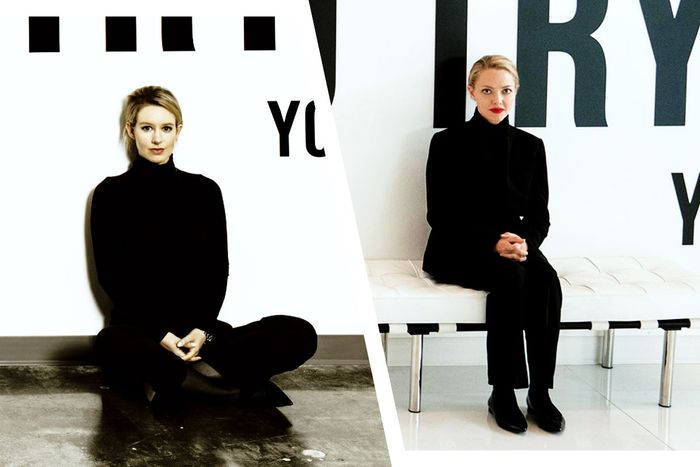
Two months after Elizabeth Holmes was convicted of four out of 11 counts of fraud and conspiracy at her blood-testing company Theranos, Hulu’s The Dropout has arrived. The series follows the trajectory of the now-disgraced Silicon Valley darling who was once viewed as a visionary CEO poised to change the world of medicine. Holmes dropped out of Stanford University at age 19 to found a biotech start-up that claimed it could perform a wide variety of diagnostic tests using only a drop or two of blood. Such technology would indeed represent a revolutionary scientific breakthrough, and the allure of the concept helped Holmes grow to become the youngest self-made female billionaire. But as reporting by the Wall Street Journal’s John Carreyrou first revealed in 2015, Theranos’s well-guarded product didn’t deliver on its lofty promises.
The end credits of each episode of The Dropout remind us that the show is based on the ABC News investigative podcast of the same name, which contains interviews with investors, patients, and former Theranos employees, as well as recordings of deposition testimony. But just how faithful is Hulu’s onscreen adaptation to its real-life source material? In case you don’t have time to delve into the history yourself, we’re comparing the major players (except for some whose images weren’t as easy to find — sorry, Edmond Ku) from each episode to their onscreen counterparts. The Dropout’s finale will stream at 3 a.m. ET on April 8. As new episodes air each week until then, we’ll keep track of where the show sticks to fact and where it may have dipped into fiction.
Elizabeth Holmes (Played by Amanda Seyfried)
Seyfried has dutifully recreated the most well-known aspects of the Theranos CEO, from Elizabeth’s baritone voice to her irregular blinking patterns and her black-turtleneck uniform. But The Dropout, interested in the internal motivations of its main character, also includes details that predate Elizabeth’s fame. Elizabeth truly did design a time machine as a child, and she did declare that she would rather be a billionaire than the president when she grew up (though according to John Carreyrou’s book Bad Blood: Secrets and Lies in a Silicon Valley Startup, she made her declaration to relatives, not her neighbors). In 2002, she was accepted to Stanford University as a President’s Scholar. The summer before she started college, she took a trip to China for a Stanford language program. There, she met Ramesh “Sunny” Balwani, who would later become her partner in both romance and business. At the time of their first meeting, she was 18, and he was 37.
While studying chemical engineering in college, she wrote a patent application for a patch that could diagnose medical conditions through blood testing and then treat them with the appropriate antibiotics. Elizabeth began raising money for this early, more ambitious predecessor to her final idea. According to Carreyrou, she initially called the company Real-Time Cures. The name Theranos was adopted after she narrowed her focus to blood testing. In the show, Elizabeth changes her idea before she officially founds the company, making Theranos her first and only iteration.
Elizabeth has testified that she was raped while attending Stanford and decided to process that experience in part by building a life with her company. She formally dropped out in March 2004, at age 19. Per the New York Times, Elizabeth contacted Balwani, who comforted her after she told him she had been raped. Carreyrou reported that records show the pair were living together by July 2005. Elizabeth later alleged that he was physically and emotionally abusive throughout their relationship.
The show remains largely true to Theranos’s various obstacles. In the early days of the company, before Elizabeth could afford a better location, she was almost hit by a stray bullet. The start-up consistently failed to produce working prototypes. Carreyrou reported that the company recorded results that were played back during demos to potential investors. Theranos later conducted trials with terminal cancer patients. While the results did not affect treatment, according to Carreyrou, that was not communicated to concerned employees. Missed deadlines and misinformation from Elizabeth eventually prompted the Theranos board to decide to depose the young founder, but she was able to convince them to give her another chance. The company decided to focus on the retail market, targeting partnerships with Walgreens and Safeway. The partnership with Walgreens, paired with a lack of reliable Theranos tests, would eventually prompt the covert use of existing third-party technology in conducting blood tests.
Elizabeth’s demeanor and appearance reportedly began to change over as the company grew. The Dropout hypothesizes that she intentionally practiced lowering her voice. (Former employees have stated that Elizabeth’s characteristic voice was fake, while her family has maintained that the baritone is natural.) Elizabeth made it clear that employees were replaceable and pushed for longer hours and faster results. She recruited assistants to monitor her employees on Facebook and increased security, siloing off teams within the company. The Dropout features a scene where an assistant hands a self-help book to Elizabeth after an employee quits. In real life, Elizabeth was actually emailed a link to that book, which was bluntly titled The No Asshole Rule: Building a Civilized Workplace and Surviving One That Isn’t.
The Dropout gets plenty of other small details right. A former employee said she saw Elizabeth jamming out to hip-hop in her car before morning meetings; Elizabeth’s enthusiastic dancing recurs throughout the show. The Theranos founder did display a Yoda quote, “Do or do not, there is no try,” on a wall in Theranos’s building, and she did indeed own a paperweight that somehow fit the phrase “What would you attempt to do if you knew you could not fail?” Meanwhile, Seyfried often recites Elizabeth’s quotes about Theranos verbatim. That applies not only to footage from interviews for the press or a documentary crew, but also to the testimony obtained by The Dropout podcast. During her trial, Elizabeth alleged that her ex-boyfriend, Sunny Balwani, was actually to blame for the company’s wrongdoing.
Ramesh “Sunny” Balwani (Played by Naveen Andrews)
Elizabeth’s ex-boyfriend was allegedly her partner in crime in more ways than one. Ramesh Balwani, known by his nickname Sunny, is currently on trial facing 12 counts of fraud and conspiracy. Compared to Elizabeth, much less is known about Balwani’s personal life. Born in Pakistan, Balwani came to the U.S. in 1986 for college and became a millionaire as an executive at a software start-up. When he met 18-year-old Elizabeth at age 37, he was married to artist Keiko Fujimoto. The pair divorced in 2002.
Though we couldn’t confirm whether Balwani shared his story with Elizabeth in Beijing like he did in The Dropout, Balwani’s attorney did tell ABC that Balwani got involved in Theranos because his father died of a preventable heart attack. Meanwhile, Carreyrou reported that before Balwani formally joined the company, some employees already knew he was Elizabeth’s boyfriend. (The two shared a Palo Alto apartment.) However, they concealed their romantic relationship from the board and investors once he joined the company in 2009 as president and chief operating officer.
In court testimony obtained by The Dropout podcast, Balwani stated that he gave Theranos a $13 million interest-free loan to support the company’s mission. (In The Dropout, he invests $20 million as part of an ultimatum issued by Elizabeth to protect her CEO position.) Balwani liked to display his wealth via the expensive cars he drove to work. Carreyrou reported that one of his license plates read DASKPTL, in a reference to Marx’s text. Another read VDIVICI, in a reference to the latter part of the Latin translation of “I came, I saw, I conquered.”
At Theranos, Balwani built a reputation as the enforcer. According to Carreyrou, he was often “haughty and demanding toward employees, barking orders and dressing people down.” His romance with Elizabeth persisted up until Theranos began to unravel; text messages from 2016 show Elizabeth texting, “I love you,” with Balwani replying, “For me you are a manifestation of love itself.” These records of their conversations also confirm that The Dropout accurately portrayed Elizabeth’s habit of affectionately calling Balwani “tiger.” Balwani’s romantic relationship with Elizabeth reportedly ended when he left Theranos around May 2016. Entering his trial, Balwani continued to maintain his innocence. Per Vanity Fair, he has claimed that he never made money from Theranos and thus could not have defrauded any investors or consumers.
Christian Holmes (Played by Michel Gill)
In interviews, Elizabeth often named her father, Christian Holmes IV, as one of her idols. Christian worked for government agencies in Washington, D.C., including the State Department and the Agency for International Development. He was related to Charles Louis Fleischmann, an immigrant who founded a successful yeast company that it made his family one of the wealthiest in America in the late 1800s. His father’s grandfather established the Cincinnati General Hospital and the University of Cincinnati’s medical school. Elizabeth said she was inspired by the humanitarian work her father did as a public servant, and she pointed toward his family’s history as a sign that medicine was in her blood. Reportedly, she also started studying Mandarin because of him; according to Bad Blood, Christian often traveled to China for work and thought his children should learn the language.
As shown in The Dropout, Christian held a vice-president position at Enron in 2001, the year that it famously collapsed due to fraud. With the company going bankrupt, Christian was laid off. Despite the financial blow, the Holmes family could still afford to pay their daughter’s Stanford tuition. And Christian remained well connected: Elizabeth testified that venture capitalist Don Lucas, a critical early investor for Theranos, was introduced to her by one of her dad’s college acquaintances. Lucas later introduced her to Oracle co-founder Larry Ellison, who made another hefty investment in her company.
Christian Holmes (Played by Sam Straley) and Noel Holmes (Played by Elizabeth Marvel)
Christian Holmes V, Elizabeth’s younger brother, also worked at Theranos as a senior manager. In 2011, he recruited several of his fraternity brothers from his alma mater, Duke University, to join the company in managerial roles. In The Dropout, it’s not completely clear if Elizabeth’s brother does much work at the company. But emails shared during Elizabeth’s trial showed that Christian, who had no experience with blood testing, made clinical decisions. He once even reprimanded Theranos’s lab director for being uncomfortable with defending a problematic test result.
Christian and Elizabeth’s mother, Noel Holmes (née Daoust), hailed from a strong military lineage. Her father was a West Point graduate, and her side of the family can allegedly trace its roots back to one of Napoleon Bonaparte’s famous field generals. Noel previously worked as an aide on Capitol Hill, but paused her career to raise her children. According to Carreyrou’s Bad Blood, Noel had a phobia of needles and fainted at the mere sight of a syringe. She was a staunch supporter of Theranos, though she was not as directly involved in the company as her son. She told Fortune that she and her husband allowed Elizabeth to drop out and use her tuition on Theranos because they wanted her to follow her dream, help people, and “change the world.”
Dr. Phyllis Gardner (Played by Laurie Metcalf)
The no-nonsense Stanford professor of medicine is one of Elizabeth’s earliest skeptics in The Dropout. The real-life Dr. Phyllis Gardner did indeed meet with then 19-year-old Elizabeth and reject the concept that evolved into the basis for Theranos. In an interview with The Dropout podcast, Gardner said that the introduction occurred after a former Panasonic executive highly praised Elizabeth and her idea. (In the show, perhaps to streamline the number of characters, Elizabeth comes on the recommendation of fellow Stanford professor Channing Robertson.) Gardner, who had experience working for both pharmaceutical and biotech start-ups, explained that it was not feasible to develop a microfluidic patch that could test blood and deliver the appropriate antibiotics.
Though Elizabeth’s reaction in the show might be a bit more confrontational than Gardner recalls (the professor told The Dropout podcast that Holmes merely “blinked” at the criticism and left), Metcalf does a good job of replicating Gardner’s irritation at Elizabeth’s attitude. “She just seemed absolutely confident of her own brilliance,” Gardner told the BBC. “She wasn’t interested in my expertise and it was upsetting.” According to Business Insider, Gardner knew Richard Fuisz, Elizabeth’s former neighbor, from her time working at a major drug delivery company called ALZA. Gardner and Fuis later formed a group chat with Ian Gibbons’s widow to discuss news about Theranos. Gardner was quoted in Wall Street Journal reporter John Carreyrou’s 2015 exposé on Theranos. The day the article was published, Gardner and Elizabeth were both attending an event as members of Harvard’s Medical School Board of Fellows. While The Dropout brings the two women together in tense conversation, Gardner told The Dropout podcast that she did not directly confront Elizabeth that day.
Richard Fuisz (Played by William H. Macy)
Richard Fuisz served as a key source in Carreyrou’s investigation and was credited for connecting Carreyrou with Theranos’s former medical director. A businessman, physician, medical inventor, and former undercover CIA agent, Fuisz lived next door to the Holmeses in Virginia. His wife, Lorraine, was close with Elizabeth’s mother, Noel. The Holmes family later moved to Texas, where Elizabeth’s father would be laid off while she was in high school. After Elizabeth left for Stanford, the family moved back to Virginia. Fuisz offered his former neighbors a free house, though they declined the offer. The Dropout simplifies the timeline, moving Fuisz to Texas so that the Holmeses can meet with him shortly after the Enron layoff.
Macy’s mustached portrayal of Fuisz is proud and vindictive; Carreyrou wrote in his book that the real-life Fuisz was known for holding grudges. Fuisz was said to be deeply offended that the Holmes family did not ask him for advice, given that Theranos was a company that fell under his area of expertise. In 2006, he filed a patent for a mechanism that could supplement a blood-testing device. The Dropout features a dramatic standoff where Fuisz reveals to Noel that he filed the patent because he hadn’t been consulted. In reality, the Fuiszes and Holmeses were already not on speaking terms by the time the patent application became publicly available. Theranos itself didn’t learn about the patent until five months later. Beyond a message sent to the general contact email on Theranos’s website, Fuisz did not bring up the patent.
In 2011, Theranos hired renowned attorney David Boies to sue Fuisz and his sons, alleging that they stole information for the patent. The lawsuit was eventually settled outside of court in 2014, but 82-year-old Fuisz apparently still isn’t over it. In March, he tweeted that the patent had nothing to do with Theranos tech and the lawsuit was instead “a vendetta by the Holmes family” caused by “[j]ealousy.”
Ian Gibbons (Played by Stephen Fry)
The Dropout’s portrayal of this respected scientist is largely supported by accounts from his widow, Rochelle. Ian Gibbons was a biochemist with a Cambridge education and a penchant for patenting inventions. He was friends with Channing Robertson, the Stanford professor who mentored Elizabeth and served on Theranos’s board. Under Robertson’s recommendation, Ian joined Theranos. Two years after he was named the company’s chief scientist in 2005, Ian was diagnosed with colon cancer.
Rochelle told Jarvis on The Dropout podcast that Ian was uneasy about Theranos’s business moves — he felt that Elizabeth was peddling claims about technology that did not exist yet. Worried about people getting hurt as well as his own scientific integrity, Ian shared his concerns with Robertson in confidence. Robertson told Elizabeth, who immediately fired Ian. The personable scientist, however, had charmed his co-workers so much that that they were able to successfully lobby for his return. Unfortunately for Ian, he was demoted to a position that involved evaluating resumes instead of performing any significant lab work.
Ian was among a group of Theranos executives subpoenaed by Fuisz’s lawyers to testify for the Theranos lawsuit. Ian did not want to commit perjury, but feared the consequences of telling the truth. His wife told The Dropout podcast that the impending trial and Elizabeth’s “intimidation tactics” triggered signs of depression. Per Vanity Fair, Ian was convinced he was going to be fired after Elizabeth requested a meeting in May 2013. Rochelle told The Dropout podcast that the next morning, she discovered that her husband had overdosed. He died a week later in the hospital at age 67. Rochelle said Theranos responded to the news of Ian’s suicide by demanding she turn over any company intellectual property left in his possession.
Dr. Jay Rosan (Played by Alan Ruck)
According to Carreyrou’s Bad Blood, Theranos contacted Walgreens via email in January 2010 to describe blood-testing technology that the company had (supposedly) developed. Jay Rosan, a physician who asked people to call him Dr. J, was the vice-president of health innovation for Walgreens at the time. He spearheaded plans to place Theranos tests in Walgreens stores. After Walgreens agreed to a preliminary contract for a pilot project, the retailer sent a delegation to meet with Theranos. The Dropout uses this meeting to pit Rosan against a far more skeptical Wade Miquelon, played by Josh Pais. Ruck’s Rosan chases the executive vice-president and chief financial officer for Walgreens down, earnestly arguing that the older generation would become irrelevant if it did not embrace technological innovation. In reality, the real Rosan had gotten Miquelon on board before the meeting; Carreyrou reported that Miquelon “seemed to be a big fan” of Elizabeth’s already.
Walgreens did hire consultant Kevin Hunter to evaluate Theranos’s laboratories for issues. Hunter grew frustrated and suspicious when his requests to see the lab or test Theranos’s tech were repeatedly denied. He told Jarvis on The Dropout podcast that company security was so tight that Sunny Balwani followed him to and from the bathroom. Despite Hunter’s misgivings, Walgreens executives like Rosan and Miquelon chose to push forward with a partnership amid fears that Theranos would choose rival CVS instead.
In 2013, Rosan and other Walgreens executives commemorated the formal partnership by performing a cover of “Imagine” with Theranos-themed lyrics (The Dropout opts for a parody of the much jauntier “What I Like About You”). The first Theranos Wellness Center opened in September of that year. The goal was for Theranos tests to be implemented in stores nationwide; ultimately, however, the tests only made it into about 40 stores. Not long after Carreyrou’s 2015 report revealed that Theranos was using standard third-party equipment rather than its own technology, the partnership dissolved. Walgreens sued for the $140 million it said it invested; Theranos eventually settled for just under $30 million. By then, Rosan had already left his position at the company. According to his LinkedIn, he currently serves as a co-founder of Medovation, a company that aims to help health-care start-ups succeed.
Tyler Shultz (Played by Dylan Minnette)
Tyler Shultz, a former Theranos employee turned whistleblower, served as a source for Carreyrou’s investigation. He met Elizabeth in fall 2011 through his grandfather George Shultz, the American diplomat who served as Ronald Reagan’s secretary of State and held several other prominent government positions. Tyler, then a 20-year-old junior at Stanford, told Elizabeth he wanted to be an intern at Theranos. According to Tyler’s book Thicker Than Water, she said the company typically didn’t accept interns. Tyler believed she made an exception for him because she was trying to get his influential grandfather to join the Theranos board at the time.
After graduating from college, he returned to the company in a full-time position. His first day at work happened to be the same day Walgreens opened its first Theranos Wellness Center. Tyler later befriended Erika Cheung, a fellow recent graduate. The two were part of a team responsible for verifying the accuracy of blood tests before devices were used with real patients. After becoming friends in the show, Tyler stays at the upstairs lab while Cheung is moved to the secretive room known as Normandy. According to Carreyrou, Tyler eventually was also sent to the Normandy area the following year, in early 2014. Over time, he grew increasingly troubled by several practices he observed that he did not feel were scientifically sound.
A scene where Tyler performed an original song about Elizabeth at her 30th-birthday party is based in fact, though Tyler said in his book that the lyrics were centered on company marketing slogans. (Per Tyler’s account, Henry Kissinger later recited an original limerick about Elizabeth in which he declared that she was not the next Steve Jobs — Steve Jobs was an earlier version of her.)
The Dropout omits one of Tyler’s early attempts to hold the company accountable: He contacted the New York State Department of Health under an alias to discuss concerns about proficiency testing and subsequently made an anonymous complaint about Theranos to New York State’s Laboratory Investigative Unit. Tyler said he never received a reply. After he later pressed Elizabeth on some claims made by Theranos in a one-on-one meeting, he found himself transferred to a team where he did not interact with Theranos devices.
Tyler’s frustrations culminated in an April 2014 email that referenced some data he’d gotten from Cheung and expressed his concerns about cherry-picked research and quality-control failures at the company. He received a scathing response from Sunny Balwani via email. Tyler replied with his two weeks’ notice but ended up leaving the company that same day.
Meanwhile, Tyler’s grandfather had grown extremely close with Elizabeth after joining Theranos’s board, and he often invited her to family events. Tyler stated in his book that although he repeatedly tried to convince his grandfather of Theranos’s fraudulent practices, George remained confident in Elizabeth. After Tyler spoke to Carreyrou, Theranos claimed to know he had been a source for the story. Tyler was blindsided by a conversation in which he lied to his grandfather and said he had not talked to Carreyrou. He then discovered that two Theranos lawyers were waiting upstairs with documents for him to sign.
His step-grandmother later helped him contact an attorney who advised George that Tyler should not sign what Theranos wanted him to. After this refusal, Tyler was allegedly followed by private investigators. In Thicker Than Water, he stated that his parents gave him pepper spray and he began sleeping with a knife by his bed. In addition to the emotional toll of this ordeal, he told Uproxx that his family ended up spending between $400,000 to $500,000 on lawyers.
Today, Tyler serves as the founder and CEO of his own biotech start-up, Flux Biosciences. The company also happens to focus on medical testing, though he assured Truffld in 2021 that the similarities with his former employer end there. “I’m trying to take what I saw at Theranos and do the exact opposite, pretty much across the board,” he said. Tyler told CBS that his grandfather never apologized, but he did acknowledge before his death that Tyler had been right about Theranos.
Erika Cheung (Played by Camryn Mi-young Kim)
Erika Cheung was another former Theranos employee who became a key whistleblower. She told the Wall Street Journal that she first spoke to a recruiter at a job fair when she was a senior at the University of California, Berkeley. In October 2013, after interviewing with Elizabeth herself, Cheung was hired at Theranos. Per California Magazine, she became close friends with Tyler Shultz and had lunch with the fellow recent graduate every day. The pair felt uncomfortable with the reliability of Theranos devices as well as the way the company handled data. But when Cheung raised concerns directly to Sunny Balwani, she told ABC that he insinuated that she would lose her job if she questioned Theranos’s methods again. Carreyrou reported in Bad Blood that Balwani also berated Cheung when he ascertained through Shultz’s email that Cheung had shared data.
Ultimately, Cheung quit Theranos after seven months, unable to reckon with potentially harming real patients. Like other sources for Carreyrou’s piece, she was followed and told that Theranos would sue her if she did not reveal what she had shared and to whom. Concerned about contacting a fellow whistleblower, Shultz cut contact with Cheung, though she did show up unannounced to check on him and bring him a lamp. In September 2015, Cheung emailed a Centers for Medicare and Medicaid Services field inspector. She explained that Theranos did not have consistently working devices, cheated on proficiency testing, and had misled a state inspector. Her message prompted a surprise inspection by the federal health regulator that eventually led to the shutdown of Theranos’s lab. Cheung later testified in Elizabeth’s trial and went on to co-found a nonprofit that advocates for ethics in emerging companies.
David Boies (Played by Kurtwood Smith)
In addition to Theranos, David Boies’s high-profile clients have included disgraced producer and sexual predator Harvey Weinstein and major corporations like Goldman Sachs. The famed attorney began his legal career in institutional corporate law and eventually started his own firm, Boies Schiller Flexner, in 1997. He gained national recognition for representing the government in a landmark antitrust case against Microsoft, serving as Al Gore’s lawyer in Bush v. Gore, and overturning California’s Prop 8 ban on same-sex marriage. In 2010, Fortune called him “corporate America’s No. 1 hired gun.” The following year, a Theranos investor asked Boies to represent Elizabeth. Per the New York Times, he accepted about 400,000 shares of Theranos in place of half of his and his firm’s fees. By 2015, he was part of Theranos’s board.
Ahead of the publication of Carreyrou’s first piece exposing Theranos’s fraudulent practices, Boies sent a 23-page letter to the Wall Street Journal that he characterized as a warning, but Carreyrou said explicitly threatened litigation. Carreyrou found out some of his sources were scared that they would not be able to defeat the renowned lawyer in court. Referencing the firm’s efforts to follow and intimidate Theranos whistleblowers, Carreyrou compared Boies Schiller Flexner’s tactics to those of “thugs.” While Boies told the Times that he took issue with that specific comment, he said that Carreyrou’s reporting on Theranos was “excellent” overall, noting that “overwriting aside, even his personal comments about me were within the realm of fairness.” Boies stopped representing Theranos in August 2015 after reportedly clashing with Elizabeth for speaking optimistically to shareholders without consulting him. Half a year later, once Theranos found a replacement, he also left the company’s board.
John Carreyrou (Played by Ebon Moss-Bachrach)
Wall Street Journal journalist John Carreyrou’s reporting, which he documented in his book Bad Blood, was instrumental in the takedown of Theranos. His investigation into the company began in early 2015, when he received a tip from a Missouri pathologist named Adam Clapper. Clapper had made a skeptical post about Theranos on his pathology blog, which led Richard Fuisz to put him in contact with other people with concerns, including Phyllis Gardner. Sensing a story, Clapper reached out to Carreyrou. According to Carreyrou, his first and most important source was former Theranos lab director Adam Rosendorff. Carreyrou would also speak with several other ex-Theranos employees (including Tyler Shultz and Erika Cheung) as well as doctors who had concerns about results their patients had received from Theranos devices.
The Dropout combines two tense, real-life meetings that Carreyrou and his editor at the Wall Street Journal had with delegations from Theranos. While the company refused to answer most of the reporter’s questions on the grounds that it had to protect trade secrets, lawyer David Boies did crucially admit that Theranos was on “a journey” and not running all of its tests on proprietary devices. As suspected sources were being followed and threatened with legal action, Elizabeth also attempted to kill Carreyrou’s story by appealing directly to Rupert Murdoch, who owned the Wall Street Journal and had been a lead investor in Theranos’s latest round of funding. Still, in October 2015, the newspaper published Carreyrou’s first piece, “A Prized Startup’s Struggles,” on its front page. Theranos vigorously denied the claims as lies. Per Vanity Fair, employees chanted “Fuck you, Carreyrou” at the Palo Alto headquarters. But Carreyrou’s follow-up pieces held up as the company came under increased scrutiny and federal investigation. When Elizabeth ultimately went on trial, Carreyrou covered the courtroom proceedings as the host of the podcast Bad Blood: The Final Chapter.
William ‘Billy’ Evans (Played by Garrett Coffey)
Elizabeth’s partner and rumored husband comes from a wealthy family, founders of the Evans Hotel Group, a hotel chain in Southern California. Billy Evans was first spotted with the disgraced Theranos founder in 2018 at the Burning Man festival. According to Business Insider, Evans is eight years younger than Elizabeth. Per his LinkedIn profile, he graduated from the Massachusetts Institute of Technology in 2015 and later worked for LinkedIn and then a tech start-up called Luminar Technologies. Little is known about the start of Evans and Elizabeth’s relationship, but their romance turned serious relatively quickly: Sources told Vanity Fair that the pair had a secret wedding in 2019, a year after they were first publicly seen together. In many photos of the couple, Elizabeth can be seen wearing Evans’s MIT signet ring around her neck. Some suspect that it served as an engagement ring instead of expensive jewelry that she might have to hand over amid her legal struggles. Elizabeth and Evans became parents to a son, William Holmes Evans, in 2021, delaying the start of Elizabeth’s trial. The New York Times reported that Evans often sat in the row reserved for her family once the trial began. At the time, CNBC reported that the couple were living together on a $135 million estate in one of Silicon Valley’s wealthiest towns. While Elizabeth is free on bond, she is ostensibly still calling that residence with Evans home.
Balto (Played by unnamed dog)
In 2017, as Theranos began to collapse, Elizabeth took a flight across the country to purchase a 9-week-old Siberian husky named Balto. According to Vanity Fair, she told colleagues that her new puppy was named for a famed sled dog who led a dangerous journey to bring crucial medication to Alaskans during a diphtheria epidemic. She began taking Balto with her everywhere, including to work. Balto, who wasn’t potty-trained, reportedly left messes throughout the Theranos headquarters for assistants to clean up. When asked about Balto’s breed, Elizabeth was said to earnestly insist that he was a wolf.


